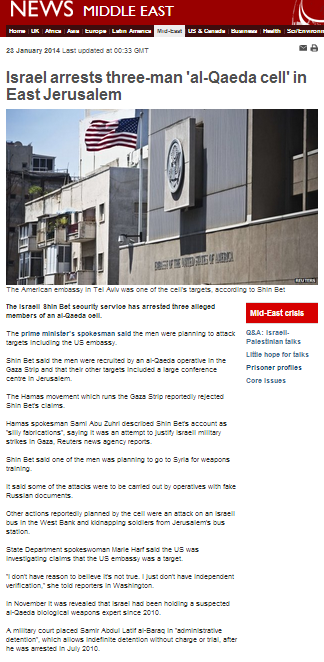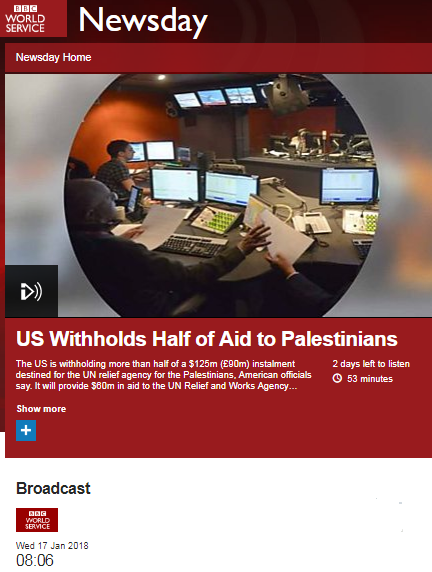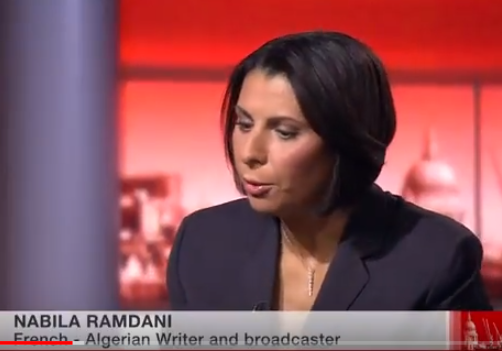Visitors to the BBC News website’s Middle East page on January 23rd may have noticed the seemingly incongruous inclusion of a statement from Hamas in a report titled “Israel arrests three-man ‘al-Qaeda cell’ in East Jerusalem“.
The report begins:
“The Israeli Shin Bet security service has arrested three alleged members of an al-Qaeda cell.
The prime minister’s spokesman said the men were planning to attack targets including the US embassy.
Shin Bet said the men were recruited by an al-Qaeda operative in the Gaza Strip and that their other targets included a large conference centre in Jerusalem.
The Hamas movement which runs the Gaza Strip reportedly rejected Shin Bet’s claims.
Hamas spokesman Sami Abu Zuhri described Shin Bet’s account as “silly fabrications”, saying it was an attempt to justify Israeli military strikes in Gaza, Reuters news agency reports.”
Beyond the decidedly bizarre scenario of the BBC choosing to quote and promote the views of the spokesman of a terrorist organization on the subject of the exposure of a cell belonging to another terrorist organization, the question which immediately springs to mind is of course why was inclusion of that statement by Abu Zuhri deemed by BBC editors to be part of the story at all?
In order to get some insight into that, we have to refer to the Reuters article from which the BBC got the information. There we find that Abu Zuhri’s statement does not so much refer to the subject of the cell’s recruiter being located in the Gaza Strip as the BBC article would have readers believe, but to other issues.
“Citing the alleged recruitment work by al Qaeda in Gaza, the Shin Bet accused Hamas authorities of “allowing Salafis to carry out terrorism as long as it is not against them”.
Hamas spokesman Sami Abu Zuhri said Israel was seeking a pretext for its attacks in Gaza. […]
Abu Zuhri said the Shin Bet statement was “silly fabrications,” adding: “Facebook is not a Hamas network.” “
The Jerusalem Post has additional information:
“It [the investigation] is also evidence of the fact that the Gaza Strip is a terrorism base for al-Qaida-affiliated elements, in addition to Hamas and Islamic Jihad, the source said.
Hundreds of Salafi-jihadis in Gaza have access to rockets and arms, and travel to Sinai to attack both Egypt and Israel, the source explained.
Hamas has reached an understanding with these elements, according to which, they must not directly harm Hamas by provoking an Israeli response against the Islamist rulers of the Strip, but are otherwise free to act as they please. There have been no recent arrests by Hamas of Salafi jihadis in Gaza. Rather, Hamas engages with these groups by deploying its own forces to rocket launching grounds to prevent attacks on Israel, and through dialogue with the al-Qaida-affiliated elements.
Outside of Gaza, Hamas supports global jihadi activities in Syria and in the Sinai Peninsula, the source continued. Hamas would prefer to avoid a confrontation with smaller terror groups in Gaza, while also avoiding a head-on clash with Egypt and Israel.”
The phenomenon of collaboration between Gaza-based Salafist Jihadis and like-minded groups operating in the Sinai – at best with the turning of a blind eye by Hamas – is one which has not received much attention from the BBC. The flow of Jihadists from Gaza to Syria has been the subject of one BBC report in the past year. Hence, the BBC’s decision to quote Hamas’ Abu Zuhri without providing details of the background information which prompted his statement (and, notably, without informing readers of the context of Israeli air-strikes mentioned by him having been carried out in response to missile fire from the Gaza Strip) actually obstructs audience understanding of the issue.
At the end of the report another old BBC story is resurrected.
“In November it was revealed that Israel had been holding a suspected al-Qaeda biological weapons expert since 2010.
A military court placed Samir Abdul Latif al-Baraq in “administrative detention”, which allows indefinite detention without charge or trial, after he was arrested in July 2010.”
As was pointed out here at the time, whilst that information may indeed have been “revealed” to the BBC in November, it certainly was not news to a whole variety of other organisations.
Related Articles:
BBC reveals the ‘secret’ detention which wasn’t
Unnoted corrections to BBC report on Salafist terror cell
BBC’s Knell shoehorns Israel into report on Syria and the Gaza Strip





